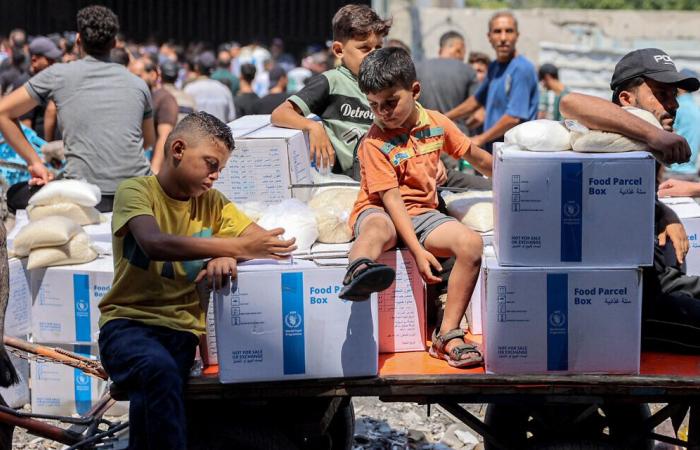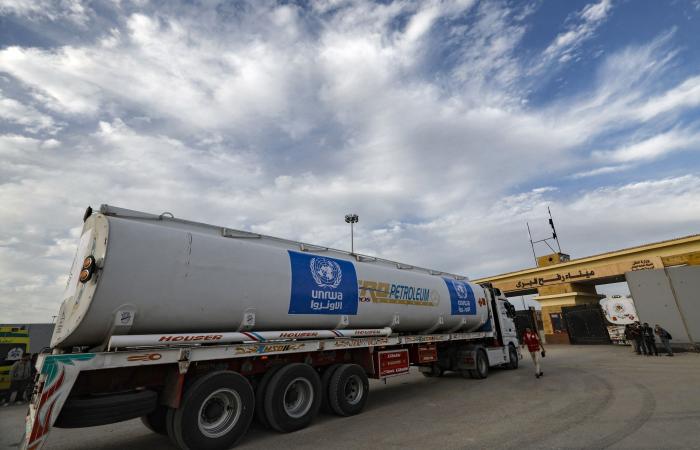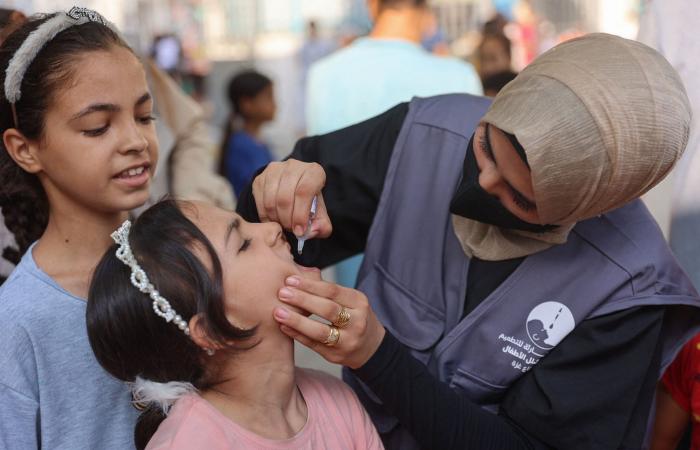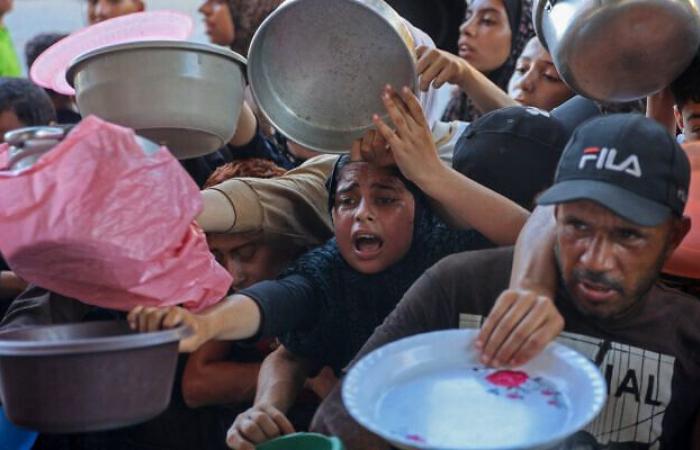The Knesset on Monday adopted a law aimed at strictly regulating the operations of the controversial Palestinian aid agency UNRWA in Israel, the West Bank and the Gaza Strip.
But these new provisions remain general, and a little vague, with legal consequences for the agency’s activities that are not entirely clear.
They could also have another type of consequence, relating to Israel’s respect for its obligations under international law and its commitment to the United States to ensure that Palestinian civilians in Gaza do not die of hunger.
Receive our daily edition for free by email so you don’t miss the best news. Free registration!
The Knesset passed these laws based on Israeli allegations that UNRWA was infiltrated by Hamas, with some of its employees apparently taking direct part in or helping to enable the October 7 atrocities, not to mention accusations that a large number of its employees in Gaza are members of terrorist organizations or that the agency allowed Hamas to divert humanitarian aid for the benefit of its armed men and used the organization as a cover for its terrorist activities.
UNRWA itself acknowledged in August that nine of its employees “may have been involved” in the October 7 attacks, before dismissing them. She also confirmed last week that Muhammad Abu Attawi, commander of the Hamas Nukhba force killed by the Israeli army in Gaza, presented as having himself murdered civilians during the attack on an anti shelter near Reim on October 7, was one of his employees.
UNRWA categorically denies that many of its employees are members of terrorist organizations.
Legislative provisions
The law, approved in the Knesset by a very large majority, was adopted in two parts.
Palestinians collect humanitarian aid at a United Nations (UNRWA) distribution center in the Rafah refugee camp in the southern Gaza Strip on July 31, 2014 (photo credit: Abed Rahim Khatib/Flash90)
The first part prohibits UNRWA from intervening in sovereign Israeli territory, which under Israeli law includes East Jerusalem and impacts UNRWA activities in the Shuafat refugee camp in East Jerusalem, for which the agency collects trash, is responsible for sanitation, manages three schools as well as a health facility and provides social services.
All this will in fact end when the law comes into force, that is to say in three months. The law does not say who will pay for these services.
UNRWA offices in Jerusalem’s Maalot Dafna neighborhood were already in the process of forced closure even before the law was passed.
The second part of the law is that which introduces the greatest legal uncertainty regarding UNRWA’s activities.
Its first provision, which came into force immediately, had the effect of reversing the 1967 exchange of letters between Israel and UNRWA under which Israel had given the agency authorization to intervene in Gaza and West Bank, territories recaptured from Egypt and Jordan during the Six-Day War.
The second clause prohibits any Israeli public agency from having any contact with UNRWA or the organization’s personnel.
In Israel’s letter to UNRWA [en 1967]Jerusalem undertook to “allow the free movement of UNRWA vehicles within and outside Israel and the areas in question”, guarantee the protection of UNRWA personnel, installations and property, provide them with the necessary papers for their activities and allow them to travel within these territories.
A tanker truck from UNRWA, the agency responsible for Palestinian refugees at the United Nations, arrives on the Egyptian side of the Rafah border crossing, with the Gaza Strip, on November 22, 2023. (Credit: Khaled Desouki/AFP)
The cancellation of these arrangements will have serious consequences for UNRWA activities in the West Bank and perhaps, although to a lesser extent, in Gaza.
The difference between the two territories lies in the fact that Israel claims not to occupy Gaza. This was the case before October 7 and the Israeli authorities still hold this line before the Supreme Court.
In the West Bank, Israel agrees that its control of territory is what is legally termed a belligerent occupation under which the military commander – in this case, the head of the IDF Central Command – is the ruler. in fact in charge of civil affairs.
Although the new body of law does not explicitly prohibit UNRWA from intervening in Gaza and the West Bank, it nevertheless deprives it of Israel’s commitment to facilitate its work.
Furthermore, he makes local law personnel of the Palestinian organization like the others [NDLT : sans statut spécial]which will not fail to handicap them in their daily work. Its international law staff could have difficulty obtaining visas and other documents required to work on site.
Furthermore, the question of humanitarian aid to Gaza will be greatly complicated by these new provisions.
The Israeli authorities, starting with the Israeli army and the Coordinator of Civil Affairs in the Territories (COGAT) unit of the Ministry of Defense, responsible, among other things, for coordinating the entry of humanitarian aid into Gaza, will be prohibited from any contact with UNRWA officials.
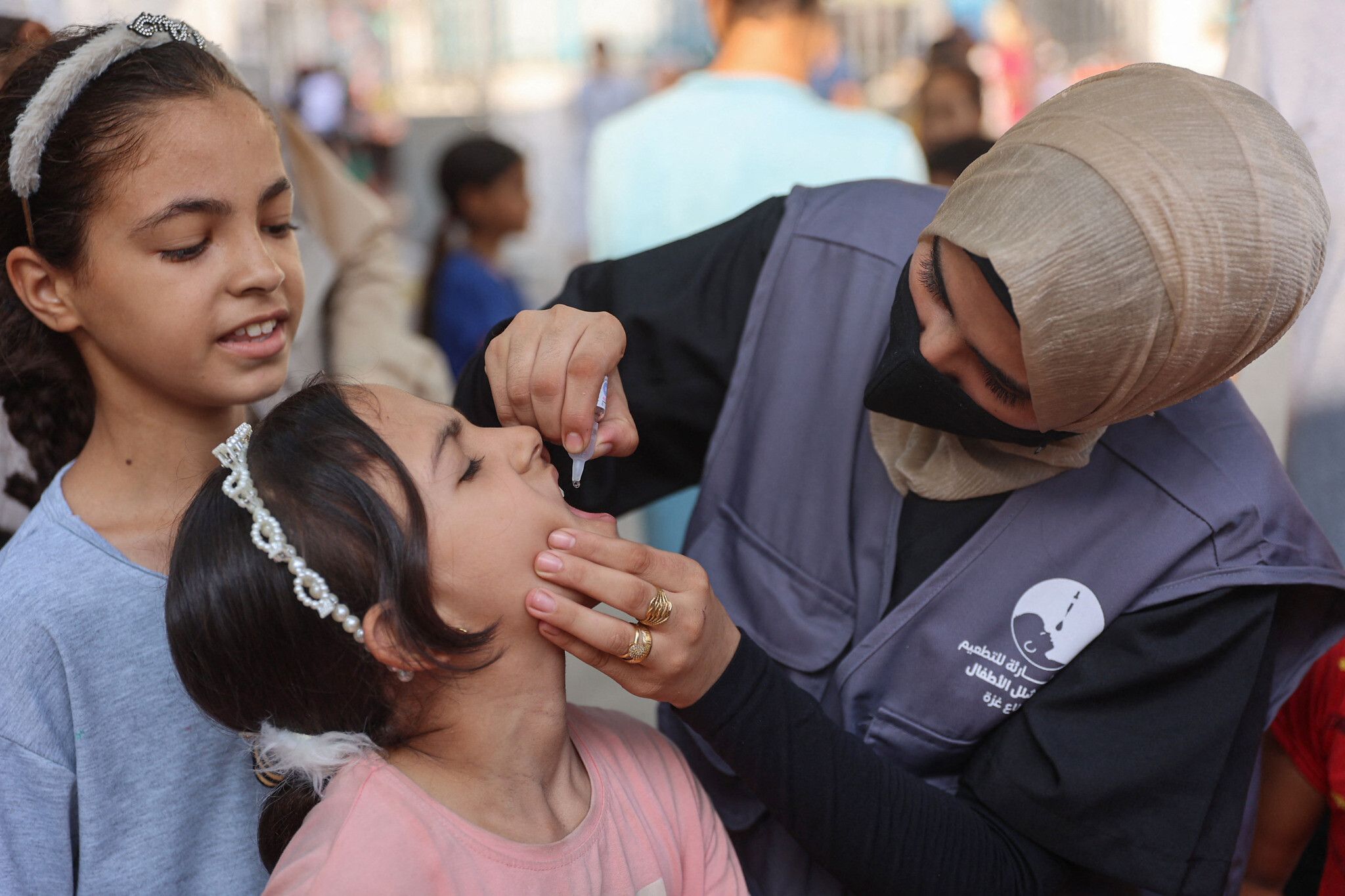
A Palestinian doctor administers polio vaccines to children at the clinic in the al-Daraj neighborhood of Gaza City on September 10, 2024. (Omar AL-QATTAA / AFP)
However, UNRWA is one of the most important agencies in terms of distributing humanitarian aid to the population of Gaza during this conflict: it is the one that takes charge of aid from the border crossing points of Gaza. Gaza and organizes their distribution to the Palestinian population inside the territory.
With these new arrangements, it will be impossible for UNRWA and COGAT to coordinate with a view to collecting aid at crossing points and it will be the same for coordination between UNRWA and the IDF regarding the delivery of aid inside Gaza.
If UNRWA is unable to coordinate its movements, its personnel risk being targeted by the IDF during their travels in Gaza, which will make these activities far too dangerous.
On a technical level, UNRWA and in particular its local staff could in theory provide the other services that the agency usually provides in Gaza, such as health care or education, to the extent that Israel does not provide them. was not prohibited.
Like the West Bank, it appears that foreign nationals working for UNRWA will not be able to obtain their visas or other documents required to enter Gaza.
At the very least, it would be possible for UNRWA to bring both humanitarian aid and foreign personnel into Gaza if the Rafah border crossing between Egypt and Gaza were open. But Egypt closed it after Israel took control of Rafah in an operation that began last May.
International legal obligations
The legal consequences of these new Israeli measures against UNRWA may not be limited to the agency’s activities but could well affect its responsibility under international law to ensure that Palestinians in Gaza do not starve.
The Fourth Geneva Convention – to which Israel is a signatory – and its additional protocols – which Israel has not signed – are interpreted as requiring that humanitarian aid be provided to civilian populations in times of war, although with exceptions.
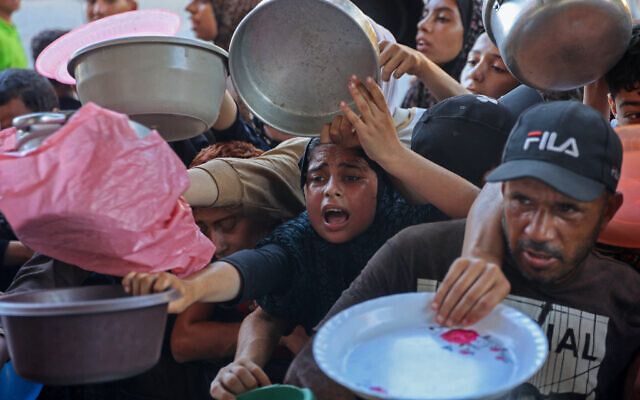
Displaced Palestinians wait for a food distribution at a distribution point set up by young men from the Madhoun family, in Beit Lahiya, in the northern Gaza Strip, July 18, 2024. (Omar Al-Qattaa/ AFP )
Furthermore, international law prohibits the use of starvation as a weapon of war and the Genocide Convention, which Israel also signed, prohibits a country from deliberately creating conditions conducive to the annihilation of a group of people.
According to Professor Yuval Shany, of the Faculty of Law of the Hebrew University, UNRWA will nevertheless continue to provide humanitarian aid to the civilian population of Gaza, faced with serious deprivations and difficulties since the beginning of the conflict.
“If you have an obligation to meet the needs of the local population but you deny the organization responsible for doing so the capacity to do so, then you are setting yourself up to no longer meet your obligations,” explains Shany.
He adds that the government has not proposed an alternative to UNRWA – an organization of which he says he is not a “fan” – and that the time limit set by law – 90 days – while the fighting is still raging, “didn’t seem very realistic.”
Shany’s remarks were echoed by senior UN officials, starting with the head of the World Health Organization (WHO), the UN Secretary-General and the head of UNRWA.
WHO Director-General Tedros Adhanom Ghebreyesus called UNRWA “the indispensable lifeline of the Palestinian people” and that the new law “prohibiting UNRWA from saving lives and protect health [des populations] » would have “devastating consequences”.
He added: “This contravenes Israel’s obligations and responsibilities and threatens the lives and health of all those who depend on UNRWA. »
The Adalah organization, which provides legal aid to Arabs in Israel and Palestinians under Israeli control, speaks of Israel’s culpability in the event of catastrophic humanitarian consequences for Palestinian civilians in Gaza.
This law, Adalah explains in a press statement, “violates several of Israel’s international obligations, including those arising from the Genocide Convention and the Rome Statute of the International Criminal Court,” an allusion to criminal liability.

